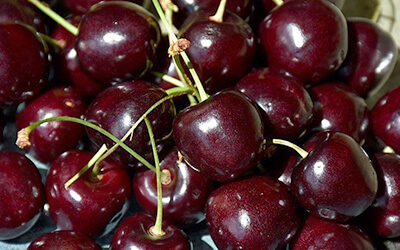CHERRY
A cherry is the fruit of many plants of the genus Prunus, and is a fleshy drupe (stone fruit).

Cherries are small stone fruits, generally averaging 2 to 4 centimeters in diameter, and have a round, oval, ovate, to cordate shape, attached to slender, pliable, and fibrous green to brown stems. The fruit’s surface is taut, smooth, glossy, and semi-thin, ranging in color from solid shades of bright red or dark red, almost black, to variegated hues of red-yellow, orange, ruby, and crimson tones. Underneath the surface, the flesh can be firm or soft, depending on the variety, and is typically aqueous, pink to red, and tender, encasing a central pit tightly adhered or loosely attached. Cherries widely range in flavor depending on the variety and sugar-acid content. Sweet Cherries generally have a balanced, sweet-tart flavor with fruity nuances. Sour Cherries contain higher acidity, contributing to tart, tangy, and unfavorable sour flavors when raw. The sharp fruits are often combined with sweeteners in cooked applications to develop even amounts of sweet and sour. In addition to the fruits, Cherry trees are often famous for their white-pink, five-petaled flowers. The delicate blossoms are highly ornamental and decorate the entire tree canopy when in bloom.

